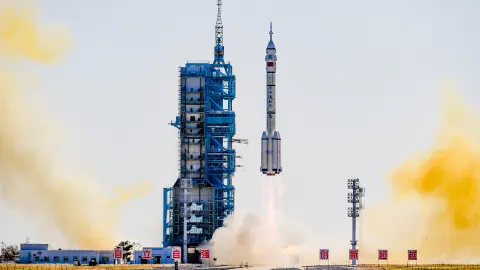On October 26, 2023, China launched Shenzhou-17 mission, sending a crew of three astronauts to its Tiangong space station The crew, consisting of Tang Hongbo, Tang Shengjie, and Jiang Xinlin, blasted off from the Jiuquan Satellite Launch Center in the Gobi Desert at 11:14 a.m. local time (6:14 a.m. GMT).
The astronauts are scheduled to spend six months on the space station, conducting experiments in space medicine, space technology, and other areas. They will also help to install and maintain equipment inside and outside the station.
The launch of the Shenzhou-17 crew is the latest milestone in China’s ambitious space program. China completed construction of its Tiangong space station in late 2022, and the Shenzhou-17 mission is the seventh crewed mission to the station.
The Shenzhou-17 crew is also the youngest crew that China has ever sent to space, with an average age of 38. This is a sign of China’s growing pool of experienced astronauts and its commitment to developing its space program for the long term.
Mission overview

The Shenzhou-17 mission is the latest in a series of missions to build and operate China’s Tiangong space station. The Tiangong space station is a three-module complex that is similar in size and capabilities to the International Space Station.
The Shenzhou-17 crew will be responsible for conducting experiments, maintaining the space station, and preparing for future missions. Some of the specific tasks that the crew will be working on include:
- Conducting experiments in space medicine, space technology, and space science
- Installing and maintaining equipment inside and outside the space station
- Conducting spacewalks to perform repairs and maintenance
- Conducting handover procedures with the next crew to arrive at the space station
Specific experiments and tasks
The Shenzhou-17 crew will conduct a wide range of experiments during their six-month stay on Tiangong. Some specific areas of focus include:
- Space medicine: The astronauts will study the effects of long-term spaceflight on the human body. This research will help to ensure the safety of future astronauts on long-duration missions.
- Space technology: The astronauts will test and deploy new space technologies, such as robotic arms and space-based manufacturing. This research will help to expand China’s capabilities in space exploration and development.
- Space science: The astronauts will conduct scientific experiments in areas such as astronomy, physics, and biology. This research will help to advance our understanding of the universe and our place in it.
In addition to conducting experiments, the Shenzhou-17 crew will also help to install and maintain equipment inside and outside the Tiangong space station. This includes tasks such as assembling new modules, repairing existing equipment, and conducting spacewalks.
Significance of the mission
The launch of the Shenzhou-17 crew marks an important step forward in China’s space programme. It proves China’s ability to operate a huge and complicated space station, and it lays the path for future Moon and Mars expeditions.
Recent updates

Key Achievements
- Cultivating Space Rice: History unfolded with the successful growth of first rice plants in space, paving the way for sustainable food production on long-duration missions.
- Robotic Revolution: Testing and deploying cutting-edge robotic manipulation technologies promise enhanced automation and precision for future endeavors.
- Probing Microgravity’s Impact: Extensive research on the effects of microgravity on human health provides invaluable insights for astronaut well-being in long-term spaceflight.
- Spacewalks and Maintenance: Demonstrating expertise and adaptability, the astronauts completed two spacewalks for equipment installation and maintenance, ensuring smooth station operation.
- International Collaboration: Ongoing collaborations with global space agencies like ESA and NASA exemplify China’s commitment to international cooperation in space exploration.
Looking Ahead
- As their mission nears its April 2024 conclusion, their data and experiences will be extensively analyzed, propelling China’s space program forward and contributing significantly to global efforts.
- The success of Shenzhou-17 paves the way for future crewed missions to Tiangong, with ambitions for longer stays and even more groundbreaking scientific undertakings. This mission marks a crucial step in China’s spacefaring journey, solidifying its position as a major player in global exploration.
ALSO READ: Understanding How Space Stations Get Oxygen
Q&A with one of the Shenzhou-17 astronauts
Q: What are some of the challenges that you expect to face on the mission?
A: One of the biggest challenges that we expect to face is the microgravity environment. Microgravity can have a number of negative effects on the human body, such as bone loss, muscle atrophy, and cardiovascular problems. We will need to take steps to mitigate these effects, such as exercising regularly and taking medication.
Another challenge that we expect to face is the isolation. We will be living and working in a confined space for six months. It is important to maintain a positive attitude and to support each other during the mission.
Q: How do you think the Shenzhou-17 mission will contribute to China’s space program?
A: The Shenzhou-17 mission will contribute to China’s space program in a number of ways. First, it will help to demonstrate China’s ability to operate a large and complex space station. Second, it will help to advance China’s scientific and technological capabilities. Third, it will help to strengthen China’s international cooperation in space exploration.
Q: What advice would you give to young people who are interested in pursuing a career in space exploration?
A: My advice to young people who are interested in pursuing a career in space exploration is to study hard and to work hard. Space exploration is a very challenging field, but it is also very rewarding. If you are passionate about space exploration, then you should go for it!
